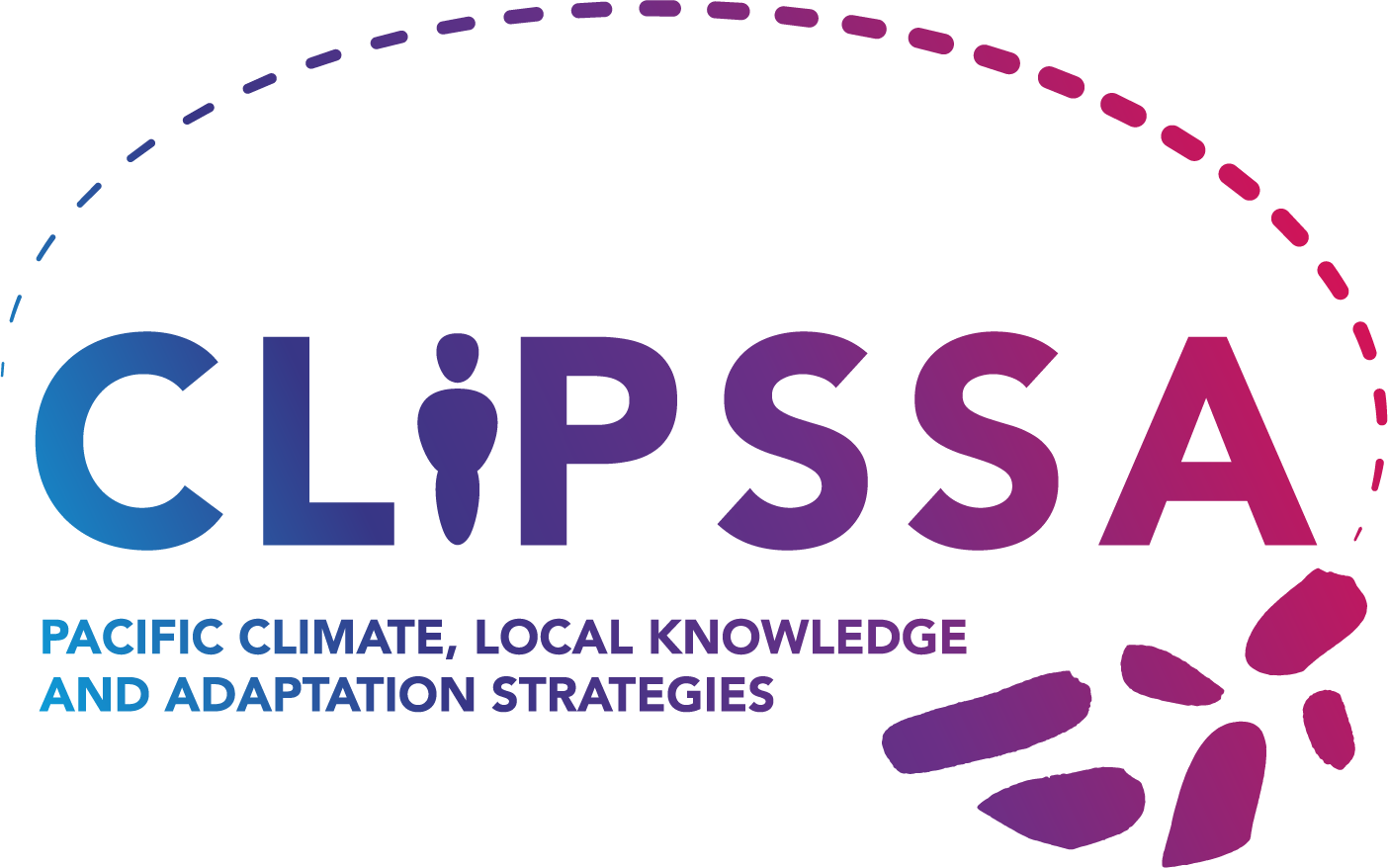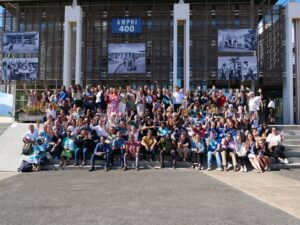
Credit: Government of New Caledonia
CLIPSSA at the second edition of the Caledonian Climate Change Forum
At the second edition of the Caledonian Climate Change Forum on Tuesday, 22 July at the University of New Caledonia (UNC), IRD, Météo-France, and the French Development Agency (AFD) were present to welcome various institutional, economic and academic stakeholders.
CLIPSSA was present at the exhibition village (Météo-France and AFD), which allowed the public to discover the advances and results. Information sheets were displayed at the exhibitions.

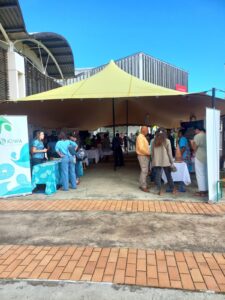
Credit: Eléa Yung-Hing, IRD
During the morning plenary session, the scientific coordinators (Christophe Menkès from IRD and Alexandre Peltier from Météo-France) shared an overview of the current state of climate science research.
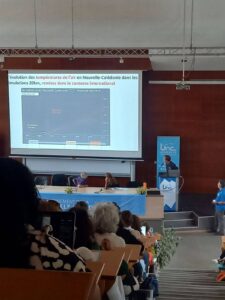
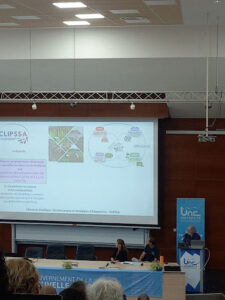
Credit: Eléa Yung-Hing, IRD
Then, in the afternoon, the CLIPSSA team organised and participated in a mini-seminar entitled ‘Agriculture, food and water use: towards a sustainable transition to respond to climate challenges’, where Fleur VALLET (geographer and project manager) and Maya LECLERCQ (socio-anthropologist, postdoctoral researcher) led and moderated discussions with the following speakers: Thomas ABINUN (Météo-France Interregional Directorate in New Caledonia and Wallis and Futuna), Sebastien BLANC (Technopole), Franck SOURY-LAVERGNE (CAP-NC), Stephane BALAYRE (DAVAR), Julie DEFFIEUX (REPAIR), Yannick FULCHIRON (Agence Rurale), Samson JEAN-MARIE (IRD), Gildas GUIDIGAN (IRD).
The presentation was divided into four main themes :
- The first focused on the effects and impacts of climate change on agriculture and water resources. Météo-France, Technopole and CAP presented the main changes in rainfall patterns in New Caledonia, as well as their concrete consequences on agricultural yields.
- The second addressed the issue of competing interests, how to reconcile the needs of agriculture, food, and other water uses in the context of competition and collective water management. DAVAR discussed the overall importance of water resources, with significant spatial and temporal variability, drinking water supply services, needs/resource assessments and local water governance.
Next, an update was provided on adaptations, analysing existing solutions and practices or those to be implemented. CAP NC and REPAIR discussed land use planning and agricultural policies, support for farmers, and changes in practices, using CLIMATERRA and REALISM as examples.
Focus on CLIPSSA :
- The CLIPSSA team took an anthropological approach to the subject.
During his presentation, Samson Jean-Marie outlined the adaptation strategies implemented by local communities during prolonged droughts, using the example of a farmer who abandoned his plantations, which his descendants were able to rehabilitate thanks to innovative solutions. He explained these different solutions, including deferred and localised weeding, mulching on crop rows or localised mulching, the coupling of irrigation systems, and the relocation and establishment of plots, with strategies to limit the impact of cyclones and erosion.
Gildas Guidigan went on to explain that plants respond to specific climate changes such as high temperatures, droughts, irregular rainfall, more frequent extreme events and increased risks to agricultural productivity through physiological, agronomic and sometimes adaptive mechanisms. Indeed, climate stress causes a decrease in photosynthesis in high heat, stomatal closure and loss of growth, reduced fertility (floral sterility, non-viable pollen), and an acceleration of the cycle (less time to produce grain). For example, tubers and cereals in the Pacific, particularly in New Caledonia, have their water requirements and increased vulnerability to heat.
To explain his research, Gildas presented the simulation tool APSIM next gen, which aims to reproduce crop growth (maize, rice, etc.), test different future climate scenarios (RCP 4.5, 8.5, etc.), evaluate alternative agricultural practices (sowing, irrigation, varieties), and assess the response of crops (rice and corn) to climate variables. Results have been observed, particularly with maize, where increasing water stress during flowering and a possible decrease in yield have been noted if the sowing date is inappropriate. For yams, high temperatures cause floral sterility, making irrigation essential in future conditions. The adaptation scenarios identified are therefore to bring forward sowing dates and choose more resistant varieties, as well as optimise water management. Plants experience climatic stress, and their responses can lead to productivity losses, demonstrating the importance of simulation models such as APSIM.
- Then, in a fourth area, the rural agency, Repair and Technopole, developed a future of possibilities based on food and agricultural models for tomorrow and collective choices to be avoided to guarantee sustainable agriculture and food in the face of future climate change. The topics discussed included the transformation and autonomy of agri-food systems, food behaviour in New Caledonia, more autonomous and economical production systems, ecosystem services and agroecology, and acclimatised local varieties.
Find the summary sheet for the round table discussion here.
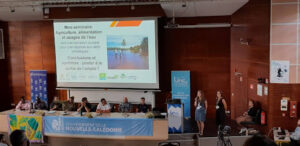
Credit: Catherine Sabinot, IRD
A youth brimming with ideas and motivation
As the government wanted to involve young people in its action plan for adapting to climate change, they were given prominence at this forum, particularly through the choice of venue for the event. Science classes were cancelled so that students could attend the round tables. Educational activities were organised at specific stands to communicate and popularise scientific research among students. Finally, the media present interviewed the young people in attendance.
- A youth advocacy event was organised to give young people a voice.
- Two slam sessions were held by Georgina Sioremu, a communications and mediation apprentice with the CLIPSSA team: the dark humour of climate change and my youth has its place.


Credit: Government of New Caledonia
This youth session echoes the study carried out in 2024 by Ilona DA CRUZ GERNGROSS, a Master’s 1 Sustainability Sciences intern in 2024 within the CLIPSSA project, ‘The integration of young people in the consultation and development processes of the climate change adaptation strategy in New Caledonia’.
